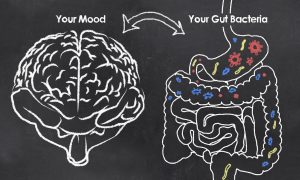 The microorganisms that make up the gut microbiome are one of the most fascinating parts of the human intestinal tract. Many people are surprised that so many tiny organisms live in the gut alone. There are estimated to be 39 trillion microbial cells.
The microorganisms that make up the gut microbiome are one of the most fascinating parts of the human intestinal tract. Many people are surprised that so many tiny organisms live in the gut alone. There are estimated to be 39 trillion microbial cells.
But what’s even more shocking is how these hundreds of different bacteria impact our health, sleep, and mood.
Is your gut microbiome impacting your body? Keep reading to find out how your gut works and what you can do to have a healthy gut microbiome.
What Is Gut Microbiome?
The gut microbiome comprises hundreds of bacteria, viruses, and fungi, also known as microbes. While they may be tiny, they work together to help regulate your body, including how your body regulates digestion and rest. It also impacts the messages sent to your brain and triggers how you feel within your body.
Here are just some examples of how the gut microbiome can cause changes to your lifestyle.
How It Affects Sleep
Having the right kind of bacteria in the microbiome can make a difference in the quality of your sleep. Additionally, studies have shown that when a person is not getting enough sleep, it can lead to poor gut microbiome health. These studies have also shown that with a careful manipulation of the microbiome, people may experience better sleep.
Getting the incorrect amount of sleep can cause the bacteria in the microbiome to have poor levels of good bacteria. These poor levels of good bacteria in the microbiome can cause a poor quality of sleep that may create a vicious cycle that can cause harm to the gut microbiome and be hard to end.
How It Affects Mood
There are around ninety percent of serotonin receptors in the gut microbiome, all of which send messages to the brain. The serotonin begins its journey in the microbiome and is then sent to the brain via the vagus nerve. Once it reaches the brain, it shares if there are any irregularities or shifts in gut activity. If the gut isn’t happy, the brain won’t be either.
For example, certain foods with additives and preservatives may disrupt the bacteria in the microbiome. Disrupting the bacteria in the microbiome can also stop serotonin from interacting with the vagus nerve, meaning that the brain does not get serotonin, leading to depression and other mental health issues.
However, recent studies have shown that the Mediterranean diet leads to a healthy gut microbiome, paving the way for improved serotonin release and improved mood.
How It Affects Overall Health
The Gut microbiome affects the entire body. However, its biggest impact is on the immune system. This is because seventy percent of your immune system is located in your gut, meaning that gut health plays a big role in fighting off viruses and diseases.
The best way to improve your gut health and immune system is being aware of how much fiber you consume. High fiber diets encourage good bacteria in the microbiome. Additionally, using natural herbs and spices not only improves the taste of foods but also increases gut microbiome health. That’s because many spices have phytochemicals that encourage healthy bacteria levels in the gut microbiome.
Concerned About Gut Health?
Many people might believe that a healthy gut microbiome only avoids an upset stomach. However, these microbes have the power to improve sleep, mood, and even the immune system.









